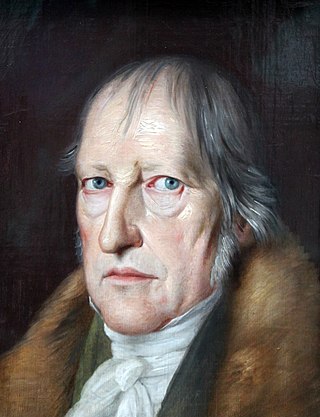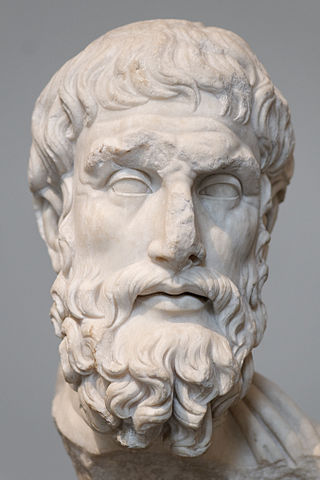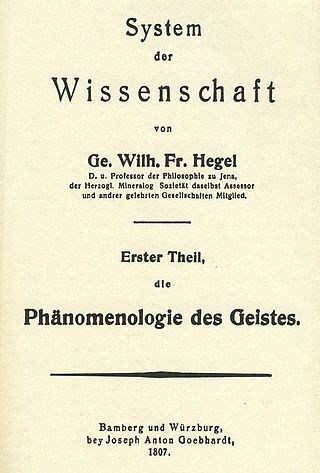
Georg Wilhelm Friedrich Hegel was a German philosopher and one of the most influential figures of German idealism and 19th-century philosophy. His influence extends across the entire range of contemporary philosophical topics, from metaphysical issues in epistemology and ontology, to political philosophy, the philosophy of history, philosophy of art, philosophy of religion, and the history of philosophy.

Lucius Annaeus Seneca the Younger, usually known mononymously as Seneca, was a Stoic philosopher of Ancient Rome, a statesman, dramatist, and in one work, satirist, from the post-Augustan age of Latin literature.

A stoa, in ancient Greek architecture, is a covered walkway or portico, commonly for public use. Early stoas were open at the entrance with columns, usually of the Doric order, lining the side of the building; they created a safe, enveloping, protective atmosphere.

In Ancient Greek philosophy, ataraxia, generally translated as 'unperturbedness', 'imperturbability', 'equanimity', or 'tranquility', is a lucid state of robust equanimity characterized by ongoing freedom from distress and worry. In non-philosophical usage, ataraxia was the ideal mental state for soldiers entering battle. Achieving ataraxia is a common goal for Pyrrhonism, Epicureanism, and Stoicism, but the role and value of ataraxia within each philosophy varies in accordance with their philosophical theories. The mental disturbances that prevent one from achieving ataraxia also vary among the philosophies, and each philosophy has a different understanding as to how to achieve ataraxia.

The Phenomenology of Spirit is the most widely-discussed philosophical work of Georg Wilhelm Friedrich Hegel; its German title can be translated as either The Phenomenology of Spirit or The Phenomenology of Mind. Hegel described the work, published in 1807, as an "exposition of the coming to be of knowledge". This is explicated through a necessary self-origination and dissolution of "the various shapes of spirit as stations on the way through which spirit becomes pure knowledge".
Eternal return is a philosophical concept which states that time repeats itself in an infinite loop, and that exactly the same events will continue to occur in exactly the same way, over and over again, for eternity.
The Eudemian Ethics is a work of philosophy by Aristotle. Its primary focus is on ethics, making it one of the primary sources available for study of Aristotelian ethics. It is named for Eudemus of Rhodes, a pupil of Aristotle who may also have had a hand in editing the final work. It is commonly believed to have been written before the Nicomachean Ethics, although this is controversial.
Stoic passions are various forms of emotional suffering in Stoicism, a school of Hellenistic philosophy.
Hellenistic philosophy is Ancient Greek philosophy corresponding to the Hellenistic period in Ancient Greece, from the death of Alexander the Great in 323 BC to the Battle of Actium in 31 BC. The dominant schools of this period were the Stoics, the Epicureans and the Skeptics.
Arius Didymus was a Stoic philosopher and teacher of Augustus. Fragments of his handbooks summarizing Stoic and Peripatetic doctrines are preserved by Stobaeus and Eusebius.
Pneuma is an ancient Greek word for "breath", and in a religious context for "spirit" or "soul". It has various technical meanings for medical writers and philosophers of classical antiquity, particularly in regard to physiology, and is also used in Greek translations of ruachרוח in the Hebrew Bible, and in the Greek New Testament.

Stoicism is a school of Hellenistic philosophy that flourished in Ancient Greece and Ancient Rome. The Stoics believed that the practice of virtue is enough to achieve eudaimonia: a well-lived life. The Stoics identified the path to achieving it with a life spent practicing the four virtues in everyday life: wisdom, courage, temperance or moderation, justice, and living in accordance with nature. It was founded in the ancient Agora of Athens by Zeno of Citium around 300 BC.
A sage, in classical philosophy, is someone who has attained wisdom. The term has also been used interchangeably with a 'good person', and a 'virtuous person'. Among the earliest accounts of the sage begin with Empedocles' Sphairos. Horace describes the Sphairos as "Completely within itself, well-rounded and spherical, so that nothing extraneous can adhere to it, because of its smooth and polished surface." Alternatively, the sage is one who lives "according to an ideal which transcends the everyday."

Stoic physics refers to the natural philosophy of the Stoic philosophers of ancient Greece and Rome which they used to explain the natural processes at work in the universe.
The philosophy of happiness is the philosophical concern with the existence, nature, and attainment of happiness. Some philosophers believe happiness can be understood as the moral goal of life or as an aspect of chance; indeed, in most European languages the term happiness is synonymous with luck. Thus, philosophers usually explicate on happiness as either a state of mind, or a life that goes well for the person leading it. Given the pragmatic concern for the attainment of happiness, research in psychology has guided many modern-day philosophers in developing their theories.
Stoic logic is the system of propositional logic developed by the Stoic philosophers in ancient Greece.

De Constantia in publicis malis was a philosophical dialogue published by Justus Lipsius in two books in 1583. The book, modelled after the dialogues of Seneca, was pivotal in establishing an accommodation of Stoicism and Christianity which became known as Neostoicism. De Constantia went through over eighty editions between the sixteenth and eighteenth centuries.

De Ira is a Latin work by Seneca. The work defines and explains anger within the context of Stoic philosophy, and offers therapeutic advice on what to do to prevent anger.

Miriam Tamara Griffin was an American classical scholar and tutor of ancient history at Somerville College at the University of Oxford from 1967 to 2002. She was a scholar of Roman history and ancient thought, and wrote books on the Emperor Nero and his tutor, Seneca, encouraging an appreciation of the philosophical writings of the ancient Romans within their historical context.

Michael Inwood was a British philosopher and fellow of Trinity College, Oxford. He is known for his works on Hegel, Heidegger and ancient philosophy. Inwood died from lung cancer in Kidlington on 31 December 2021, at the age of 77.











